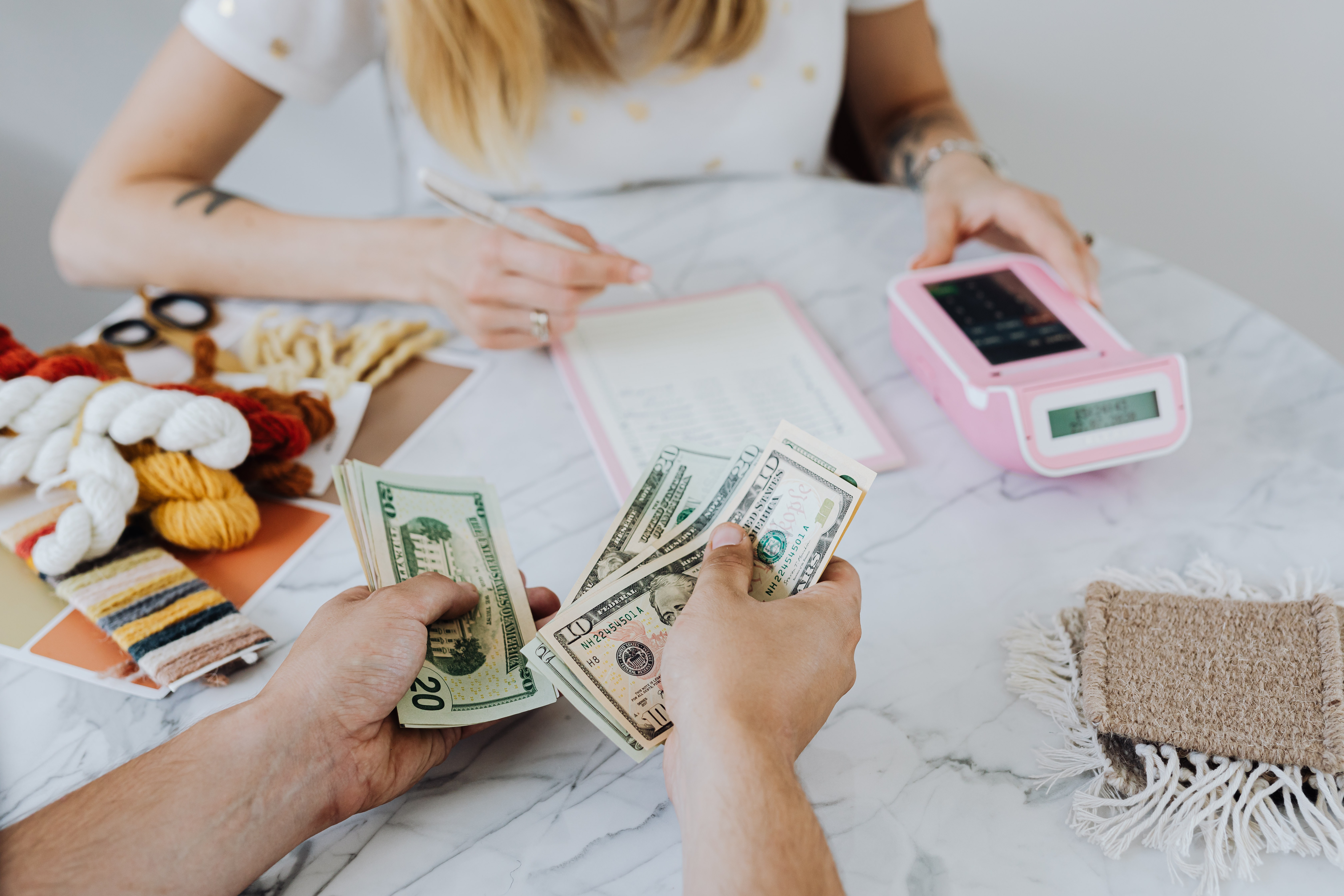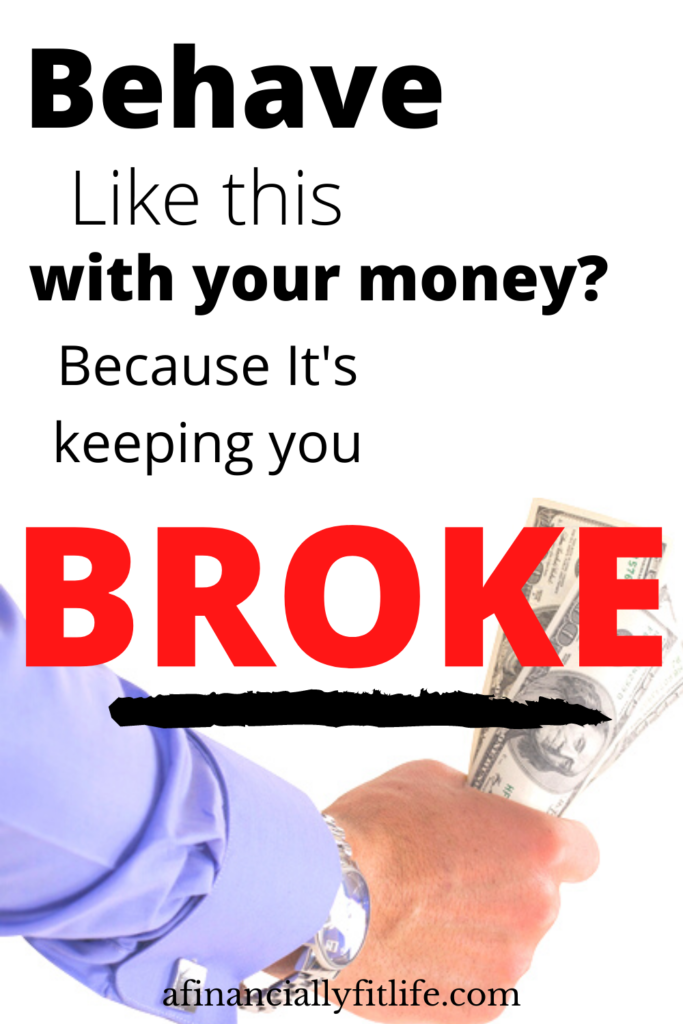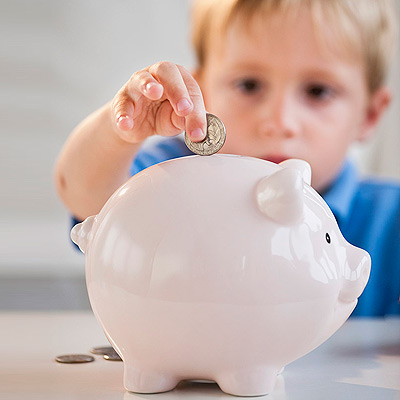From mindset shifts to bad habits, here are some poor money behaviors you may want to consider changing. Build a better financial life by acting and thinking differently about your money.

To get better with money, I had to learn how to abandon some of my old poor money behaviors.
Some of those behaviors I didn’t even realize were affecting my ability to build a better financial future.
But as the years have passed, I have learned to let some of those behaviors go. Some were just poor habits I had created over time and, others involved ignorance and thinking everything I believed about money was the truth.
As you embark on your financial journey, you will realize what behaviors no longer fit your new financially successful life. But what you will also recognize is how easily those attitudes and actions can be changed.
Here are 7 money behaviors I stopped to build a better financial life…
Not budgeting and being aware of my income
The first bad behavior I had to stop was not budgeting and being aware of my income.
And I’m not even sure I can call this a bad behavior, but more just a lack of knowledge.
When I first started working at 15, I was very responsible with my money. Ask my parents. I paid for my gas, car insurance, saved, and bought most of what I wanted with my own money.
But as my income grew, I became more irresponsible.
I had no clue where my money was going and, because I was making more money, I paid less attention to my income.

All my bills and debt payments were made on time. I bought whatever I wanted and needed, so I thought my money behaviors were good.
When I was 15 and busing tables at a local diner, I only had so much money coming in. I paid attention to every dollar because I had to. After I put money in savings, paid for my gas which was $5 a gallon at the time, I didn’t always have a ton leftover.
But during and after college, spending became easier because making money was easier.
When Mike and I moved in together, I remember sitting down and calculating how much we spent on groceries in one month. It was like $1,000!
Make sure to check out this post to read more about how we stick to our grocery budget.
And I was stunned and, yet I still never implemented the act of budgeting.
I truly believe if you want to build a better financial future, you need to budget.
Basing my success on a bank account number
Tell me I’m not the only person who used to do this.
Before I started my debt-payoff journey, I used to base my spending and success on how much money was in my account.
I would never let that amount dwindle past a particular number.
I acted like my account balance was my financial advisor.
This behavior no one taught me but, I’m sure other people do.
I never felt comfortable with less than $1,000 in my checking account. I wasn’t looking at money from an abundant mindset and, I certainly didn’t have a budget at this point either.
My bank account acted as my budget and determined how I spent my money. If I had over $1,000.00, I felt good and would spend it. If there was less than $1,000.00, I would reel it in until there was.

I thought if you don’t bounce checks, overdraft your account, or spend more than you make, you are good at managing your money.
Today I still have a buffer in my bank account. But not because I need it to validate the way I should spend my money but place a small cushion between me and life.
Basing my financial behaviors on a bank account number was poor becuase I let it control my spending.
Remember money is only a tool and it can take you wherever you want but, it won’t replace you as the driver.
Caring what other people were doing
Once I started paying off debt I, stopped caring about what other people were doing.
Acting like others and spending money the way other people do, I wish wasn’t a behavior. But it is and, many of us do it.
Starting my debt-free journey in my late twenties meant that people were buying houses, nice cars, designer items, having fancy weddings, babies, and traveling.
Learning to not care what other people were doing was a behavior I cherish still to this day.
Starting my debt-free journey meant I had to stop comparing my financial situation to other peoples.
Trying to live the like the Jone’s is a real thing and not keeping up with them is much easier said than done.
I had to learn to take the path least driven to prove to others that living a better financial life meant doing the opposite of what everyone else was doing.
Caring about what others were doing wasn’t going to help me become more financially successful actually, it was hurting me.
Mindlessly spending money
Mindlessly spending money was a bad habit that I developed over time.
The act of spending money without any intention was a bad behavior I didn’t know I had until starting this journey.
On the weekends, I would spend money just to spend money.
When I was in college, I would go shopping to buy a new outfit almost every weekend and never wear it again.
Impulsively spending money is a behavior I still struggle with today. It’s a hard habit to crack but, it has gotten much better.
Spending unintentionally no longer went with the new financial life I was trying to build. I had to learn why I was mindlessly spending and shift that behavior to better suit my new goals.

I will admit I love spending money.
This type of money behavior is hard to break and very common.
Feelings drive our actions. Our feelings are the reason why we spend money mindlessly, impulsively, or unintentionally. Once I understood that my feelings were driving the spending, I learned how to behave differently.
Beating myself up for past financial mistakes
Being angry about my past financial mistakes was another behavior pattern I had to change.
I acted as if my past financial decisions were the reason I was in my current situation. And if I hadn’t made those choices maybe life would be different.
Thinking I would be in a better financial position if I hadn’t done this, that, or the other, was not helping me build a better financial life.
My financial past and previous behaviors have helped shape me into the person I am today. And without those poor behaviors, maybe I wouldn’t have learned from them.
I don’t use my college degree and sometimes I regret spending all that money. Mike and I paid for a very expensive wedding not considering the financial consequences it would have. I bought a new car at 21 based on a payment number I could afford.
Without making all of these money-related mistakes I’m not sure I would have ever started my own financial journey.
Regret can be a great driving force, so I no longer think of my financial past as a mistake but a stepping stone to where I am today.
Not teaching myself about money
Younger me never took any time to learn about finances. Why would I?
I acted as if there was nothing to learn. You made money, you spent money.
Pay your bills on time, spend money, and get a good job so you can pay for all of them.

I knew nothing about retirement, debt, budgeting. And everything I know now I have taught myself. I didn’t learn any of this in school and beyond the basics, my parents didn’t talk about money.
And now I learn about money all the time. I spend my time reading, listening, studying, and now I’m teaching others.
This is a behavior I am so glad I have implemented. And you can do it too. Learning about money isn’t hard and it can be very rewarding.
Behaving like debt is the only way
Having debt was something I thought everyone just had. I had no clue there were other options. Rich people were the ones that didn’t have debt.
Acting like debt was normal is exactly what normal people do. I’m not normal.
Other than my home, I have no debt. And I would not consider myself rich or even close to it.
I had to stop acting like debt was the only way to afford things.
I had no clue that there were people in this world walking around not owing other people money.
Debt isn’t always a bad thing, and there are plenty of people who manage their money very well and have debt. It is possible to live and have debt in a responsible manner, but it is also possible to live without it.
If I need to turn to debt in the future, I am fully confident it will be the right choice for my family.
Changing my money behaviors was not an easy task.
Some behaviors were easier to change than others. And these 7 are not all of them.
Starting a financial journey means shifting the way you act, feel, and behave towards money. Your past also does not determine your future.
If you are reluctant to change your money behaviors I encourage you to take the plunge. Learn how to better conduct yourself and respond differently than you normally would.
Money behavior also isn’t just the act of being able to count money or learning math. The Cash Dad has a great article about how being successful with money is all about changing your behavior.
My success has a lot to do with changing all the previous behaviors I had towards money. Not saving, not investing, not tracking my expenses, and behaving like everyone else was not how I was going to gain financial success.
I encourage you to pay a little more attention to the way you act around money. Changing your money behaviors will be a good thing.
Key Points
- Behave like you love and appreciate your money. Track it, be aware of it, know where it’s coming from and where it’s going.
- The amount you have in your bank account should not act as your financial advisor. You tell your money where to go and how you spend it.
- Behaving like everyone else will get you exactly where everyone else is.
- Being unintentional, impulsive and irresponsible with your money will not lead you to the successful financial life you deserve.
- Stop beating yourself up for your past financial mistakes, behave wisely towards the future.
- Teach yourself everything there is to know about bettering your financial situation. Behave like a student and take action!
- People do live without debt.
What are some money behaviors you have changed?
Interested in reading more?
How to stick to your grocery budget
Does a no spend actually save me money?
How to make a money vision board for financial motivation
What are sinking funds and how they will save your budget
Pin for later
